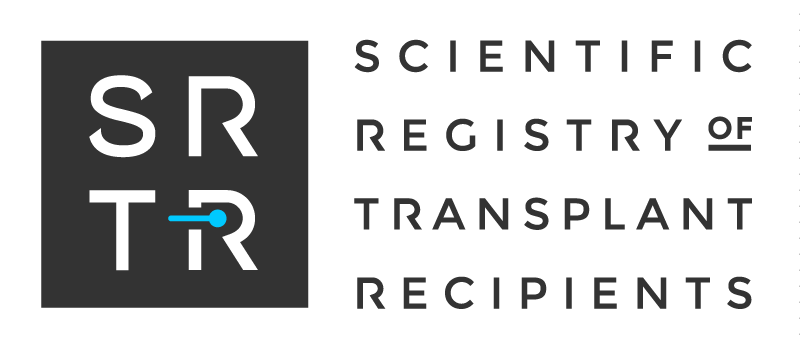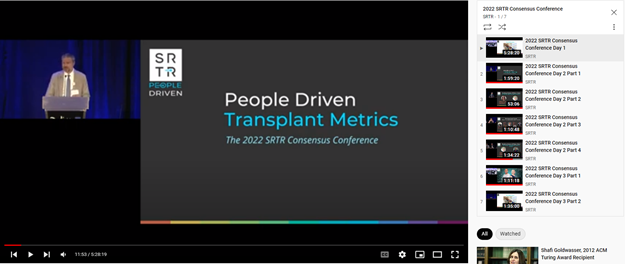Webinars and Educational Videos
Continuing Education and Beyond
Previous Webinars & Videos
Watch SRTR's Task 5 Webinar to learn more about updates on transplant metric recommendations from the 2022 Consensus Conference.
This video explores reasons for organ transplants and the beginning of a patient's transplant journey. It also highlights the Scientific Registry of Transplant Recipients (SRTR) as a valuable resource for transplant-related information.
A guide for transplant programs to understand how the 5 tiers are determined and how programs are assessed.
2022 SRTR Consensus Conference
Watch the 2022 People Driven Transplant Metrics Consensus Conference on-demand videos on SRTR's YouTube channel.
This video (for transplant programs) provides a brief explanation of how SRTR calculates estimated probability of survival using the Kaplan-Meier method.
October 27, 2021
This video discusses SRTR's goals when serving the transplant community. It also touches on the Task 5 Initiative: a task under the current SRTR contract meant to identify metrics to assess national transplantation system performance and support informed decision-making by critical audiences.
This video answers questions like where transplant programs and organ procurement organizations can find their CUSUM (cumulative sum) charts, why SRTR produces them, what data are included, and how to use the charts to monitor performance on a monthly basis.
Learn more about how SRTR serves the transplant community through a data driven approach, and about SRTR's mission to help make a difference in the field of organ donation and transplantation.
This webinar presents SRTR’s ongoing analysis of how the COVID-19 pandemic has affected the nation’s transplant system. Data are presented both at the system level and at the transplant program–organ procurement organization level.
An educational guide for organ procurement organization (OPO) personnel to understand SRTR's Organ Yield Calculator and how to most effectively use it.
How are risk adjustment models built and what do they mean for your program? How are covariates derived and how can you predict your program’s overall risk by reviewing the covariates? All this and more in this in-depth, informative session.
This webinar discusses helpful tools available to transplant programs on the SRTR public website. Tools include the Liver Waitlist Calculator, the Kidney Transplant Decision Tool, the Pretransplant Survival Worksheets, and the Posttransplant Expected Survival Worksheets.
A guide for transplant programs to understand how candidates’ status on the waiting list affects mortality rates.
A guide for transplant candidates to understand information provided in SRTR's program-specific reports (PSRs).
A guide to understanding information provided on the SRTR public website including searching for a program, sorting through the results, comparing multiple programs, and understanding program summary information.
This webinar focuses on the SRTR metrics of waitlist outcomes (transplant rate and waitlist mortality rate), SRTR tools to help transplant programs take a deeper dive into these metrics, and future directions of reporting outcomes following placement on the waiting list.
Learn about SRTR metrics available for organ procurement organizations (OPOs). SRTR discusses current metrics, new CUSUM charts to monitor donor yield, and future directions in OPO metrics.
OPO Yield Performance Monitoring: Secure Site
A guide to reference materials provided on the SRTR secure site for organ procurement organizations (OPOs).
OPO Performance Monitoring: Public Site
A guide to reference materials provided on the SRTR public site for organ procurement organizations (OPOs).
Program Performance Monitoring: SRTR Public Site
A guide to reference materials provided on the SRTR public site.
Program Performance Monitoring: SRTR Secure Site
A guide to reference materials provided on the SRTR secure site.
Offer Acceptance: Metrics, Methodologies, and Insights
SRTR began publicly reporting new offer acceptance metrics for heart, kidney, liver, and lung programs in 2017. These metrics are designed to provide programs with data about their acceptance patterns within various subgroups of offers, and allows programs to benchmark against other programs nationally. In addition, SRTR began providing CUSUM charts for offer acceptance on SRTR's secure website. This webinar describes the new metrics and the methodologies used to derive them, and provides insights for interpreting and using them.
August 23, 2017
SRTR Reporting for OPOs: Metrics, Risk Adjustment, and Available Tools
Under contract with the Health Resources and Services Administration (HRSA), SRTR is charged with reporting on the performance of organ procurement organizations (OPOs). This webinar covers the reports and tools SRTR makes available to OPOs. Key metrics and the statistical models used to adjust for donor characteristics are reviewed. The Organ Yield Calculator is highlighted, along with new reports of transplant program organ offer acceptance patterns.
New Website and Tiered Outcome Assessments
SRTR hosted an informational webinar about the new SRTR website and tiered outcome assessment systems. SRTR’s goals were to describe the motivation behind the changes, compare and contrast the 3-tier and 5-tier outcome assessment methodologies, and address common questions about the two systems. Information was provided as to how interested parties may submit feedback regarding the website and outcome assessment systems.

